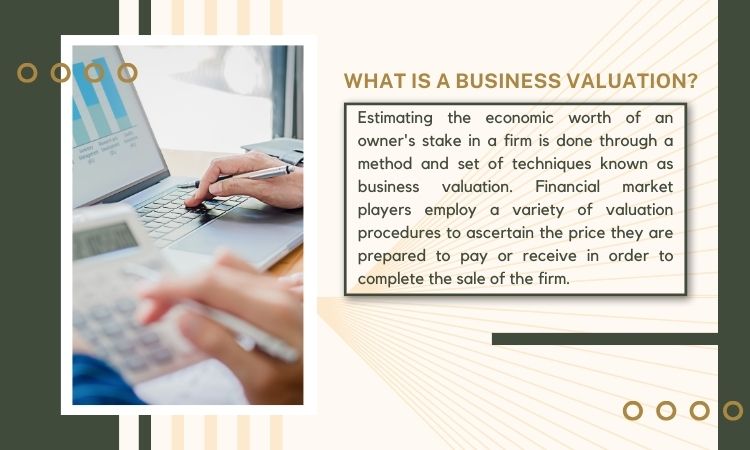In the world of business, understanding your company’s worth is crucial. Whether you’re considering a sale, seeking investment, or simply planning for long-term growth, a reliable business valuation provides a roadmap for strategic decision-making. However, navigating the valuation process can be especially challenging in today’s volatile market climate.
Market fluctuations can significantly impact the perceived value of a business, making it essential to factor in these external uncertainties. This blog post dives into the intricacies of how market volatility influences business valuation. We’ll explore how key factors like a company’s financial metrics, discount rates, and comparisons to similar businesses are all susceptible to the ebbs and flows of the market.
Table of Contents
ToggleHow Market Fluctuations Affect Financial Metrics
The core of any business valuation lies in its financial health. However, market fluctuations can create a ripple effect that impacts these very metrics used to assess a company’s worth. Let’s delve into some key examples:
1. Revenue and Earnings:
Market downturns can lead to shifts in consumer behavior, potentially causing a decrease in demand for goods and services. This can translate to lower revenue and ultimately, reduced earnings for the business. Conversely, a booming market might see a surge in sales, leading to higher profitability.
2. Cash Flow:
Market volatility can disrupt a company’s ability to manage costs effectively. For instance, during periods of inflation, the cost of raw materials or supplies might increase, squeezing profit margins and impacting cash flow. Conversely, a stable market allows for better cost control and potentially improved cash flow.
3. Access to Capital:
Investors may be not willing to put money into start-ups or already-established businesses in markets that are uncertain. This can make it more difficult and expensive for businesses to access capital for expansion or acquisitions, potentially hindering growth and impacting future cash flow generation.
Valuation experts are well-versed in recognizing these market-driven changes in financial metrics. They employ sophisticated techniques to analyze trends, adjust for potential short-term fluctuations, and project future performance based on a realistic understanding of the current market climate. This ensures a more accurate picture of a company’s underlying value despite temporary market turbulence.

Discount Rates and Market Risk
Discount Rate: Reflects Time Value & Risk
Imagine a company that would eventually provide a consistent flow of cash. To determine its current value, we need to consider these future cash flows, but not at their face value. This is where the idea of a discount rate is useful. It reflects two key considerations:
- Time Value of Money: Because of the possibility of investing and generating a return in the interim, a dollar obtained today is worth more than a dollar received in a year.
- Investment Risk: There’s inherent uncertainty about actually receiving those future cash flows. The discount rate considers this risk – the higher the perceived risk, the higher the discount rate applied.
Market Volatility and Discount Rates
Now, here’s where market volatility enters the equation. When markets are volatile, the perceived risk of an investment increases. Investors become more cautious, demanding a higher return for taking on that risk. This means that a business’s anticipated future cash flows will be discounted at a greater rate.
Impact on Present Value
Let’s break this down further. A higher discount rate means a steeper discount applied to those future cash flows. Think of it as a steeper slope on a graph – the further out the cash flow is projected, the more its present value is discounted. As a result, the present value of the entire stream of future cash flows – which ultimately determines the business’s valuation – gets lower due to the increased risk reflected in the higher discount rate.
Valuation Expertise in Volatile Markets
In essence, market volatility injects a layer of uncertainty into the valuation process. A valuation expert considers this market risk by adjusting the discount rate to reflect the current market climate, ultimately providing a more accurate picture of the business’s value despite the potential for future fluctuations.
Impact on Market-Based Business Valuation Approaches
Another common valuation method relies on comparisons – how a company stacks up against similar businesses in the same industry. This is known as the market-based valuation approach and often involves techniques like Comparable Company Analysis (CCA). Here’s how market fluctuations can influence this method:
Comparable Companies
Market-based approaches rely on the valuations of similar companies (comps) as a benchmark. However, these comps are not immune to the effects of market volatility. When the overall market experiences a downturn, valuations of companies within the same industry might also decline, even for businesses with strong fundamentals. Conversely, a booming market can inflate the valuations of comps, potentially overstating the value of the target company.
Adjusting for Market Fluctuations
This doesn’t render market-based approaches useless. A skilled valuation expert understands the influence of broader market trends. They will meticulously analyze the comps, considering factors like the timing of their valuations and any recent market events that might have skewed their prices.

Normalization and Adjustments for Accuracy
Techniques like normalization adjustments can be applied to account for differences in factors like size, profitability, or capital structure between the target company and the comps. This helps isolate the company’s intrinsic value and mitigate the distorting effects of pure market sentiment.
By carefully considering market conditions alongside the financial health of comparable companies, a valuation expert can leverage market-based approaches effectively even in volatile market environments.
Practical Considerations for Business Owners
Navigating a volatile market can be unsettling, but there are steps business owners can take to solidify their position:
Focus on Core Business Fundamentals
Market fluctuations are temporary, but a company built on strong fundamentals will weather the storm. Double down on core business activities that drive revenue and profitability. Streamline operations to improve efficiency and cost control.
Emphasize Growth Potential
While market conditions might be uncertain, highlight your company’s long-term potential for growth. Demonstrate a clear vision for the future, backed by a strategic plan that leverages emerging opportunities.

Maintain Transparency with Stakeholders
Open communication is key during market volatility. Keep your stakeholders informed about your strategies and how you’re adapting to changing conditions.
Consider Professional Business Valuation
In volatile markets, relying solely on outdated valuations can be misleading. A professional valuation service can provide an accurate assessment of your company’s worth considering current market dynamics. This can be crucial for strategic decision-making, attracting investors, or pursuing mergers and acquisitions.
By taking these steps, business owners can navigate market volatility with a clear head and a well-defined plan, ensuring their company remains resilient and poised for future success.
Conclusion
Market fluctuations can influence business valuation, but understanding these dynamics empowers informed decisions. By considering how volatility impacts financial metrics, discount rates, and comparable companies, you gain valuable insights into your company’s true worth.
Remember, market fluctuations are temporary. A strong valuation built on solid financials and a clear vision positions your company for success regardless of short-term turbulence.
For expert guidance, Marcken Consulting’s valuation specialists can provide accurate assessments considering current market conditions. Contact us to navigate market volatility and achieve your strategic goals.
Frequently Asked Questions
Q1. How much will the current market volatility affect my business valuation?
Unfortunately, there’s no one-size-fits-all answer. The impact depends on various factors like your industry, financial health, and the specific valuation methods used. However, understanding how market fluctuations influence financial metrics, discount rates, and comparable companies (as discussed in the blog) can help you anticipate potential impacts.
Q2. What information should I prepare for a valuation during a volatile market?
Having your latest financial statements, industry reports, and any relevant information about your future plans and growth potential will be helpful. A professional valuation service will guide you through the specific information they require.
Q3. If the market is down, does that automatically mean my business valuation will be lower?
Not always. A strong business with solid financials and a clear growth plan might see a smaller impact on its valuation compared to a company heavily reliant on market trends. A professional valuation considers these nuances and assesses your company’s intrinsic value beyond just current market sentiment.


